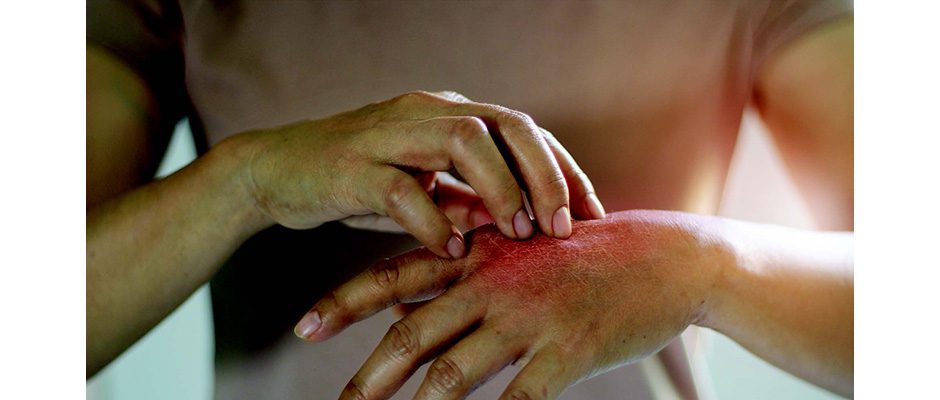
[This article was written by Vishwala Kasbekar, MD, MPH, Internal Medicine – Pediatrics Physician, St. Peter’s Health Partners Medical Associates.]
The arrival of winter and the attendant cold, dry air, finds a lot of people reaching more regularly for hand and body lotions to addresses issues with dry skin. But, for some, the arrival of winter can also mean increased flare-ups of painful psoriasis.
Although many view psoriasis as just a “skin condition” it is actually a chronic disease of the immune system, with symptoms that can range from mild to severe.
Symptoms include red, scaly, thick patches of skin on the body, usually on the scalp, elbows, knees and buttocks. The patches are caused by a rapid increase in the rate that skin cells are replaced. These patches are not contagious, but can be embarrassing for patients who are self-conscious about their appearance.
Psoriasis can strike at any age, and runs in families. Occasionally, the onset is triggered by something like a throat infection, a cut or bruise to the skin, or emotional stress.
For those suffering with psoriasis, the winter months can be particularly challenging, as a combination of the dry air, colder temperatures, and decreased sunlight exposure can all contribute to flare-ups. Winter is also prime cold and flu season and a compromised immune system can, in turn, affect psoriasis.
According to the National Psoriasis Foundation, frequent moisturizing and use of a home humidifier can help alleviate some of the symptoms. Discuss with your doctor possible treatments to control your psoriasis in the winter, including controlled doses of ultraviolet rays and prescription medications.
Additional self-care measures to reduce flare-ups or their severity include:
- Be watchful for skin injury/infections
- Reduce stress
- Get regular exercise
- Avoid harsh soaps
- Keep skin soft with moisturizing lotions, especially during the cold, dry winter months
About 30 percent of psoriasis patients eventually develop psoriatic arthritis. Because of the chronic inflammation, patients with moderate/severe psoriasis may be at increased risk of serious disorders like diabetes, hypertension, Crohn’s and heart disease.
In fact, a study in the Journal of the American Medical Association suggests that psoriasis is an independent risk factor for heart attack. As the severity of the disease increases, so does the risk.
If you believe you may have psoriasis or psoriatic arthritis, your first step is to consult with your primary care physician, who can provide a formal diagnosis and get you started on a treatment plan.
Providing routine care for illness, injury and chronic conditions for patients of all ages, Capital Region Family Health Care – East Greenbush is conveniently located at 2 Empire Drive, Suite 100, Rensselaer, just minutes from Exit 9 on I-90.
Our expert and caring providers offer adult and geriatric health care; pediatric exams; routine immunizations and preventive inoculations; preventive health and wellness care; and patient education. The practice also offers onsite X-ray and laboratory/phlebotomy services. For more information, call 518-286-4899.





